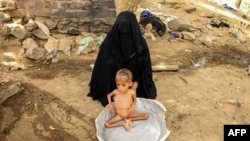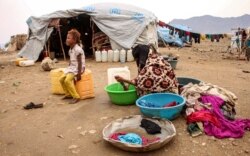The U.N. humanitarian operation in Yemen is rapidly running out of money and will soon have to reduce food rations to 12 million people and shutter life-saving programs, if donors do not make good on pledges.
"We are desperate for the funds that were promised," Lise Grande, U.N. Humanitarian Coordinator for Yemen, said in a statement Wednesday. "When money doesn't come, people die."
Only three of the U.N.'s 34 major humanitarian programs in Yemen are funded for this year.
The humanitarian crisis is the result of more than four years of fighting between a Saudi Arabian-led coalition in support of Yemen's government against Iranian-aligned Houthi rebels, who seized the presidential palace and forced the president to resign.
Yemen is the United Nation's largest humanitarian operation, but it is severely underfunded. Of the $4.19 billion needed for 2019, only 34% has been received.
Two of the largest donors to the humanitarian response plan also are two of the war's main protagonists — Saudi Arabia and the United Arab Emirates. Each country pledged $750 million to fund programs in 2019, but have paid just a small portion of their pledges.
Saudi Arabia has paid $127 million and the UAE $160 million. The U.N. says both countries also have contributed an additional $89 million and $38 million, respectively, for organizations working outside of the plan.
In a country where 10 million people live on the brink of famine, the U.N. says without rapid funding it will have to cut food rations to 12 million people and end services to 2.5 million malnourished children.
More than half of Yemen's health facilities have closed due to damage from bombings and shortages of supplies and staff. But 19 million now face losing access to health care due to the financial shortfalls.
In May, the U.N. was forced to suspend most vaccination campaigns and also has stopped purchasing medicines. Meanwhile, health workers are battling a major cholera epidemic and a rise in diphtheria and measles cases.
"Millions of people in Yemen, who through no fault of their own are the victims of this conflict, depend on us to survive," Grande said. "All of us are ashamed by the situation. It's heart-breaking to look a family in the eye and say we have no money to help."





